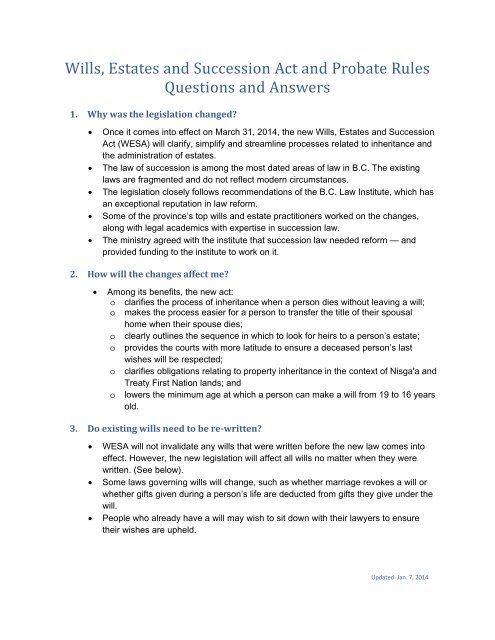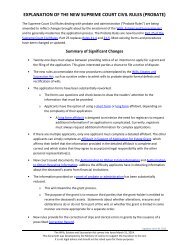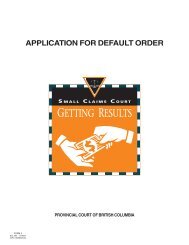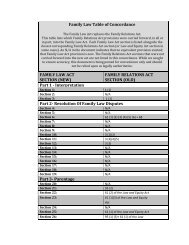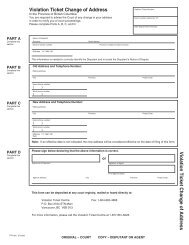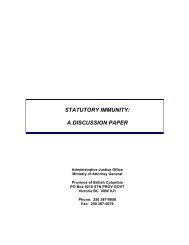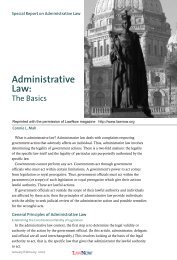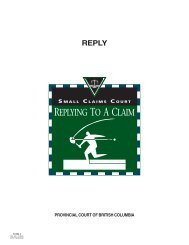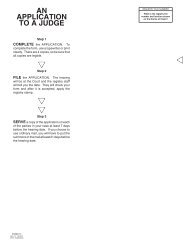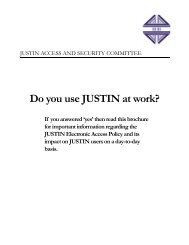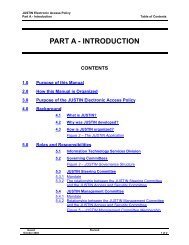Wills, Estates and Succession Act and Probate Rules - Jan. 7, 2014
Wills, Estates and Succession Act and Probate Rules - Jan. 7, 2014
Wills, Estates and Succession Act and Probate Rules - Jan. 7, 2014
You also want an ePaper? Increase the reach of your titles
YUMPU automatically turns print PDFs into web optimized ePapers that Google loves.
<strong>Wills</strong>, <strong>Estates</strong> <strong>and</strong> <strong>Succession</strong> <strong>Act</strong> <strong>and</strong> <strong>Probate</strong> <strong>Rules</strong><br />
Questions <strong>and</strong> Answers<br />
1. Why was the legislation changed?<br />
<br />
<br />
<br />
<br />
<br />
Once it comes into effect on March 31, <strong>2014</strong>, the new <strong>Wills</strong>, <strong>Estates</strong> <strong>and</strong> <strong>Succession</strong><br />
<strong>Act</strong> (WESA) will clarify, simplify <strong>and</strong> streamline processes related to inheritance <strong>and</strong><br />
the administration of estates.<br />
The law of succession is among the most dated areas of law in B.C. The existing<br />
laws are fragmented <strong>and</strong> do not reflect modern circumstances.<br />
The legislation closely follows recommendations of the B.C. Law Institute, which has<br />
an exceptional reputation in law reform.<br />
Some of the province’s top wills <strong>and</strong> estate practitioners worked on the changes,<br />
along with legal academics with expertise in succession law.<br />
The ministry agreed with the institute that succession law needed reform — <strong>and</strong><br />
provided funding to the institute to work on it.<br />
2. How will the changes affect me?<br />
<br />
Among its benefits, the new act:<br />
o clarifies the process of inheritance when a person dies without leaving a will;<br />
o makes the process easier for a person to transfer the title of their spousal<br />
home when their spouse dies;<br />
o clearly outlines the sequence in which to look for heirs to a person’s estate;<br />
o provides the courts with more latitude to ensure a deceased person’s last<br />
wishes will be respected;<br />
o clarifies obligations relating to property inheritance in the context of Nisga'a <strong>and</strong><br />
Treaty First Nation l<strong>and</strong>s; <strong>and</strong><br />
o lowers the minimum age at which a person can make a will from 19 to 16 years<br />
old.<br />
3. Do existing wills need to be rewritten?<br />
<br />
<br />
<br />
WESA will not invalidate any wills that were written before the new law comes into<br />
effect. However, the new legislation will affect all wills no matter when they were<br />
written. (See below).<br />
Some laws governing wills will change, such as whether marriage revokes a will or<br />
whether gifts given during a person’s life are deducted from gifts they give under the<br />
will.<br />
People who already have a will may wish to sit down with their lawyers to ensure<br />
their wishes are upheld.<br />
Updated: <strong>Jan</strong>. 7, <strong>2014</strong>
4. What are some indicators that I should review my will?<br />
You should consider reviewing your will if:<br />
You’ve made specific gifts of both personal property <strong>and</strong> l<strong>and</strong>;<br />
In your will you gave someone personal property which is subject to a security<br />
interest (such as a car with car payments);<br />
You made a gift to a child in your lifetime <strong>and</strong> intend that the amount of this gift be<br />
deducted from their share of your estate;<br />
You made a gift of a specific amount of money to a person in your will <strong>and</strong> then<br />
decided to give them the money as a gift while you were alive;<br />
You made a promise to give your child a gift of money while you were still living <strong>and</strong><br />
this gift is unpaid; or<br />
You intend to pay a debt by making a gift to the person you owe money to in your<br />
will.<br />
5. What are the general transition rules for the <strong>Wills</strong>, <strong>Estates</strong> <strong>and</strong> <strong>Succession</strong> <strong>Act</strong>?<br />
<br />
<br />
Generally, WESA will apply to a deceased’s will or estate if they die on or after<br />
March 31, <strong>2014</strong>.<br />
The Estate Administration <strong>Act</strong>, <strong>Wills</strong> <strong>Act</strong>, <strong>and</strong> other legislation replaced by WESA<br />
apply to the deceased’s estates if they die before March 31.<br />
6. Will the new law apply to wills that have already been written?<br />
If a person dies after March 31, <strong>2014</strong>, WESA will apply to their will, regardless of<br />
when the will was made.<br />
However, a will revoked by marriage under the old act is not revived by the <strong>Wills</strong>,<br />
<strong>Estates</strong> <strong>and</strong> <strong>Succession</strong> <strong>Act</strong>, even if the person who made the will dies after March<br />
31, <strong>2014</strong>.<br />
WESA will not apply to a will if the person who made the will died before March 31,<br />
<strong>2014</strong>. There is no benefit to waiting until after March 31, <strong>2014</strong> to apply to administer<br />
the estate in the hope that WESA will apply.<br />
For example, if a person dies before March 31, <strong>2014</strong> with a document that<br />
expresses their last wishes, but which does not meet the formal requirements to be<br />
recognized as a will, the provisions in WESA that allow a non-compliant document to<br />
be recognized in a will will not apply.<br />
7. What are the general transition rules for the new <strong>Probate</strong> <strong>Rules</strong>?<br />
<br />
For the probate rules it is the date of application (not date of death) that matters. If<br />
you are applying before March 31 you should use the ‘old’ forms (<strong>and</strong> the old rules<br />
apply). If you apply after March 31, <strong>2014</strong>, then, regardless of the date of death, you<br />
should use the new forms (<strong>and</strong> the new rules apply).
8. What if someone is in the middle of administering an estate when the new law<br />
comes into effect?<br />
<br />
<br />
<br />
After March 31, <strong>2014</strong>, the new probate rules will apply to all applications for probate<br />
<strong>and</strong> administration, regardless of when someone died.<br />
In a situation where someone applied for probate under the old probate rules (using<br />
the old forms), if they or someone else needed to file additional forms related to that<br />
application after March 31, <strong>2014</strong>, then they would use the new forms <strong>and</strong> follow the<br />
new probate rules.<br />
It’s important to note that estates that have already been administered will not be<br />
affected.<br />
9. Under the old act, a will was revoked if someone married. Why wasn’t this<br />
provision carried forward into the new act?<br />
<br />
<br />
<br />
Many people were unaware that marriage actually revokes a will.<br />
Under the old act, this means that people who married -- <strong>and</strong> subsequently died<br />
without revising their will -- weren’t necessarily having their last wishes carried out.<br />
This change will help ensure their wishes are carried out as intended.<br />
10. How does the new legislation impact costs? Will it cost more to file for<br />
probate?<br />
<br />
<br />
<br />
The new act will have virtually no impact on probate or filing fees.<br />
Currently, a person does not need to pay probate fees if the estate is worth less than<br />
$25,000.<br />
This will stay the same under the new rules.<br />
11. What are the fees associated with probate?<br />
In British Columbia, the basic fee to apply for probate is $200.<br />
The basic fee is waived if the value of the estate does not exceed $25,000.<br />
In addition to the basic application fee, there is a requirement that the following fees<br />
be paid:<br />
o $6 for each $1,000 or part of $1,000 of the value of the estate in excess of<br />
$25,000, up to $50,000, plus:<br />
o $14 for each $1,000 or part of $1,000 of the value of the estate in excess of<br />
$50,000.<br />
These fees are unchanged under the new act <strong>and</strong> probate rules.<br />
12. Why does it take so long for the act to come into effect?<br />
<br />
<br />
The legal community <strong>and</strong> the general public, as well as the courts, need to have an<br />
opportunity to underst<strong>and</strong>, prepare for <strong>and</strong> adapt to the changes.<br />
It’s not uncommon to have an extended period between the time an act is passed<br />
<strong>and</strong> the date it is implemented.
The length of time depends on the complexity of the changes that need to be<br />
completed prior to implementation.<br />
13. Why did it take so long to announce WESA’s implementation date?<br />
<br />
<br />
<br />
Although the act has already passed, the probate rules also needed to be changed<br />
to align with the new act.<br />
The ministry partnered with the B.C. Supreme Court <strong>and</strong> the B.C. Law Institute to<br />
ensure there is a set of probate rules that works both for the public <strong>and</strong> courts.<br />
Working collaboratively with these other organizations resulted in scheduling<br />
challenges, due to competing priorities, so the project took a bit longer than originally<br />
anticipated.<br />
14. Why was the small estates provision left out?<br />
<br />
<br />
<br />
<br />
<br />
<br />
<br />
It was no longer needed.<br />
The benefit of the small estate procedure was that it would be simpler <strong>and</strong> faster.<br />
In drafting the new probate rules, we have created prescribed forms very similar to<br />
the small estate declaration proposed by the B.C. Law Institute.<br />
The new rules make a distinction between simple <strong>and</strong> complex applications <strong>and</strong><br />
ensured that their processing is dependent upon the complexity of an application,<br />
rather than the value of the estate.<br />
Therefore, there wasn’t any advantage to these provisions, as all applicants will get<br />
the same benefits under the new probate rules – those with simple applications in<br />
particular.<br />
As an example, simple applications are those where there is no apparently later will<br />
that needs to be explained, where there are no issues surrounding the signing of the<br />
will, where there are no h<strong>and</strong> written alterations to the will <strong>and</strong> no documents<br />
referred to in the will that appear to be missing.<br />
It should also be noted that the fee structure has not changed – individuals still will<br />
not be required to pay probate fees if the estate is with less than $25,000.<br />
15. How does the new law support First Nation treaty obligations?<br />
<br />
<br />
<br />
<br />
As a result of treaty legislation, the Nisga'a First Nation <strong>and</strong> other Treaty First<br />
Nations have authority to make their own l<strong>and</strong> laws.<br />
The new law clarifies how the new act will work – particularly around property<br />
inheritance – in the context of Nisga'a <strong>and</strong> Treaty First Nation l<strong>and</strong>s.<br />
Certain property of a deceased member of a First Nation, such as cultural artifacts or<br />
l<strong>and</strong>, may be communally owned. Therefore, the deceased may not have an<br />
unfettered right to give that property away under their will.<br />
The legislation ensures that First Nations have a right to be informed when a<br />
member of their nation dies, to ensure they can assert these communal rights, if<br />
necessary
16. How do probate rules provide for consistency for registries across the<br />
province?<br />
<br />
<br />
<br />
<br />
This is another example of government working to streamline court processes to<br />
provide more timely service for British Columbians.<br />
Currently, there are no st<strong>and</strong>ardized application forms, <strong>and</strong> court registries across<br />
the province have their own processes for dealing with probate applications.<br />
That will change under the new probate rules. By st<strong>and</strong>ardizing the forms <strong>and</strong> the<br />
court process throughout the province, we can ensure consistency for probate<br />
applicants.<br />
Consistent forms <strong>and</strong> greater certainty around registry obligations in the application<br />
process should also make things easier for registry staff <strong>and</strong> ideally shorten<br />
processing times.<br />
17. What will the government be doing to ensure British Columbians know about<br />
the new law?<br />
<br />
<br />
The ministry is sending out letters to identified stakeholders <strong>and</strong> those who<br />
participated in the consultation process.<br />
The ministry is working with organizations that provide continuing legal education to<br />
lawyers <strong>and</strong> public legal education organizations to develop material over the next<br />
year to assist lawyers <strong>and</strong> the public prepare for the new law <strong>and</strong> court rules.<br />
18. Who was consulted on WESA?<br />
<br />
<br />
<br />
<br />
<br />
<br />
<br />
WESA is the result of extensive consultations.<br />
There were two consultation stages.<br />
First, the B.C. Law Institute had over 30 volunteer lawyers <strong>and</strong> academics working<br />
on various subcommittees developing recommendations, as well as consulting<br />
extensively beyond these volunteers in developing its recommendations.<br />
The ministry then undertook its own consultation process after receiving the B.C.<br />
Law Institute’s recommendations.<br />
The consultation was open to the public <strong>and</strong> identified stakeholders were contacted<br />
directly <strong>and</strong> invited to comment.<br />
Feedback was received from the public, Canadian Bar Association, estate <strong>and</strong><br />
financial planners, bankers, legal advisors <strong>and</strong> the public guardian <strong>and</strong> trustee.<br />
The probate rules also represented the recommendations of volunteer lawyers <strong>and</strong><br />
academics. The final development was the result of close collaboration with a Master<br />
of the Supreme Court <strong>and</strong> court registry staff.


